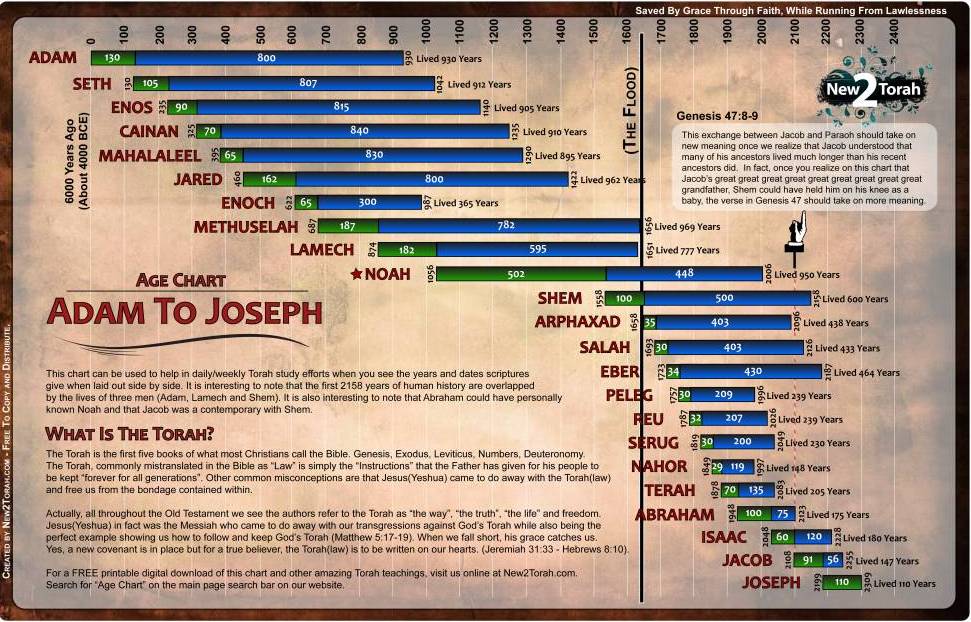Several years ago, I started writing a novel. The premise was simple. It was going to be an epic high fantasy in the vein of J.R.R. Tolkien’s Lord of the Rings and C.S. Lewis’ Chronicles of Narnia. The subject matter of my novel would be something I had not seen covered before.
What if you were transported back in time to the early chapters of the Biblical book of Genesis? What would you find? According to the narrative, among other things, there would be men and women living for centuries, and there would be giants.
How would the presence of these two change the dynamics? How would they change the way early societies formed and progressed? This would be the central question of my novel, as such was going to be the world it was set in.
In recent weeks, I wrote on the topic of giants in the Bible in ‘There Were Giants In The Earth In Those Days.’ Now I would like to turn your attention to another seemingly fantastical subject. Let us consider the poly-centenarians in the genealogies of Genesis.

Centuries Instead of Decades
Today we measure our lifespans in years and decades. I am in my thirties. My father is in his sixties. Both of my grandmothers are in their nineties.
According to the World Health Organization, the average life expectancy in the United States of America in 2015 was 79.3 years. That span placed the U.S. 31st among the nations of the world.
Just so, what is commonly referred to as ‘mid-life crisis’ typically occurs around age 40. Whatever women in such a mindset do, men buy expensive sports cars, take up new hobbies, and try to rediscover their manly vigor because they realize they’re on the latter half of life. It’s downhill from here, or something like that.
But what if we all measured our existence by the century instead of by the decade? A midlife crisis might not come until our 400th or 500th birthday.
Imagine you at 400 or 500 years old waking up to decide “I’m going to reinvent myself.” In all probability, you’d have already reinvented yourself several times over by then, but I trust you take my point.
On The Relative Age of Things and People
Consider also the possibilities for condescension. In a world where some men and women could boast of being hundreds of years old, would the octogenarian be treated like a whippersnapper the same way teens and 20-somethings often are by those in their 30’s and 40’s?
And just think of all the history you might be able to learn either first-hand or second-hand.
Consider again the Genesis genealogies. The Bible says Methuselah lived to the ripe old age of 969. If I were able to talk with someone that old today, they would have been born in the year 1050 AD. They might be a 38th great grandfather or great grandmother. Can you imagine asking them what life was like during the First Crusade?
How would being able to ask questions like that alter our perception of time?
Think of it. Not only would your life expectancy alter the pace at which you lived life and weighed your decisions; the perspective garnered and shared by those who had experienced centuries of history first-hand would be at your disposal, there to grant insight and wisdom of a kind and quality we can hardly even begin to imagine.
Technological and Societal Advancement
For another thing, consider the great inventors, innovators, and scientists of the 19th and 20th centuries – men like Thomas Edison, Nikola Tesla, Albert Einstein, and Henry Ford.
When did they really hit their stride? To be sure, formative experiences earlier in life contributed, but they were into life a few decades before they really started making their world-changing discoveries.
And from when such men have typically hit peak productivity throughout history, how much longer do they have to live? Again, only decades at most.
Imagine the possibilities if such geniuses had centuries still ahead of them. What might they come up with as they built discovery upon discovery based on the first-hand knowledge and experience of their earlier breakthroughs?
Consider also that the presence of poly-centenarians would translate into political changes.
In America, for example, we are not even 250-years removed from 1776 and the Founding Fathers’ signing of the Declaration of Independence from Great Britain. What would it do to all these debates between progressives, conservatives, and independents about the original intent of our nation’s founding documents if the Founding Fathers themselves were still alive?
Picture Thomas Jefferson being asked to weigh in on the latest Democratic presidential debate by Chris Matthews or Tucker Carlson.
What Things May Come, Or Have Been
I have read more than a few headlines and articles about scientists working on the problem of human longevity, and only more and more in recent years as the science progresses and sights are set ever higher.
One pathway being explored is genetic. Are there certain sequences in our DNA, certain special genes that can be switched on and off to prolong our lives by reversing the aging process?
Or can DNA be taken from certain animal species which are resistant to cancer or heart disease, or which otherwise have greater longevity than your average human, and can this DNA be inserted into that of human beings to give them special traits?
Another pathway to extending human lifespans is more in the realm of robotics and computer science. Transhumanists fantasize about circuit boards and synthetic organs being installed when our old parts wear out and break down. Surgeons already replace bad knees and valves, but many want to push the boundaries still farther.
Some even go so far as to speculate that someday we will be able to upload our consciousness into a computer and live forever, in a sense.
The Plausibility of Genesis Genealogies
If King Solomon was right, “What has been is what will be, and what has been done is what will be done, and there is nothing new under the sun.” But of course, Ecclesiastes is Scripture. And I believe “all Scripture is God-breathed,” and that includes this assurance.
It also includes the genealogies in Genesis which tell us that the first several generations of men lived for many centuries.
When I hear men and women, especially professing Christians, dismissing the credibility of Genesis as reliable history by citing the impossibility of the lifespans claimed therein, my heart sinks.
How can such be impossible when many scientists today are working diligently on the problem of how to extend longevity in our day – at first to centuries, but ultimately to an indefinite or even eternal length of time? A lot of very learned and highly intelligent people in the world obviously do not think such is impossible, otherwise they would not be working on it.
But that question brings us to the crux of the matter. The objection to the lifespans in Genesis is not based on a belief that such lifespans could never in the future be possible.
Rather, the evolutionary model first popularized by Darwin assumes that we represent the pinnacle of human development. The farther back in human history we look, the more primitive man was. This model also assumes no Creator, and it also assumes that death and dying have always been a part of life on Earth just as they are today.
If one sets that model aside, however, and considers that man was initially created to live forever by the God of Genesis, the genealogies become suddenly and entirely, not only plausible, but even necessary.
Of Possibilities Utopian and Dystopian
In the modern scientific pursuit of greater human lifespans, the outlook is typically rosy. We want to live longer, even forever. Imagine all the good we might do if we lived longer. Think of all the ways civilization would change for the better as the great inventors, innovators, and leaders were able to carry on.
It is worth considering, however, that according to the Bible, God regretted having made man when He looked at what was happening in Noah’s day.
“The earth was corrupt in God’s sight, and the earth was filled with violence.”
That God then resolved to send a global Flood to correct the situation tells us that all was not for the better for man living longer. Some useful innovations no doubt resulted. Perhaps better and more efficient and productive ways to organize society had been devised. Nevertheless, the overarching theme was violence and corruption.
Did mankind become bored with being good? What happened?
In short, sinful humanity, with demonic encouragement and guidance, devised ever more clever and comprehensive ways to be evil.
For all I want to imagine how good it might be to have George Washington still providing leadership and Leonardo da Vinci still inventing in our day, the villains would also live as long. Imagine the terror if Genghis Khan had lived and ruled until the age of 650 instead of 65.
Indeed, often throughout history all that has relieved a people from the tyranny of monstrous despots has been that they eventually grew old and died. Lifespans of centuries would give terrible genius a lot of time to consolidate their power and find ever more creative ways to oppress.
And so it was before the Flood in Noah’s day.
Shorter Lifespans a Mercy?
“Then Yahweh said, “My Spirit shall not abide in man forever, for he is flesh: his days shall be 120 years.”
Genesis 6:3 (ESV)
This verse rests in the middle of the introduction to why God sent the Flood. Immediately preceding and following it are an explanation that is hard for modern readers to fathom. Fallen angels had interbred with human women to produce a hybrid race, great and terrible.
In the following paragraph, we see that God regretted making man and resolved to send the Flood. In this context we are introduced to Noah.
Was the reduction of human lifespan, and even the Flood itself, only a punishment, or was it also a mercy of sorts?
Not only did God save Noah and his family by warning and commanding them to make an ark. We too as descendants of Noah were spared the terror of living in the evil conditions which existed before the Flood.
This fact notwithstanding, we should remember what Jesus said about his second coming.
“Just as it was in the days of Noah, so will it be in the days of the Son of Man.”
Luke 17:26 (ESV)
Can we understand what that means? Do we even aspire to?
Again, “there is no new thing under the sun.”
Far from being embarrassed by the Genesis genealogies, we Christians would be wise to embrace the biblical narrative in its entirety, and meditate on the ramifications. Only then can we fully appreciate the goodness and wisdom of God, as well as both His justice and mercy.
After all, it was for this reason the good Lord gave us the Scriptures to begin with.
